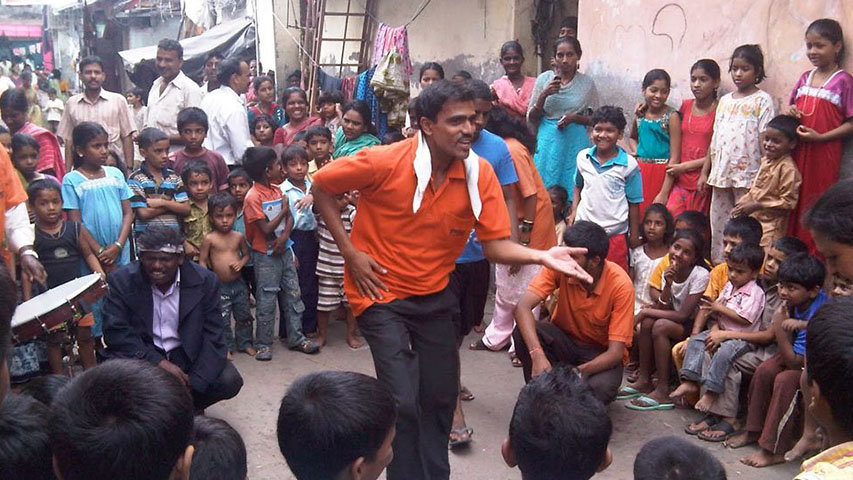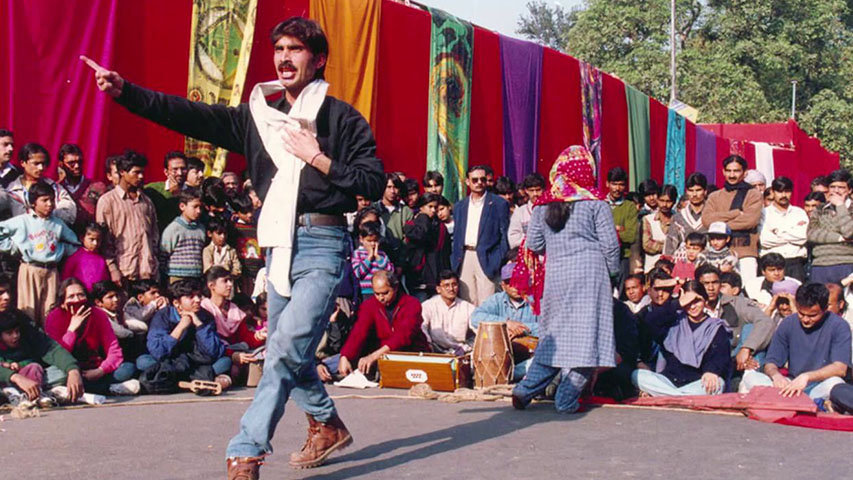
Celebrating National Street Theatre Day
by Yash Saboo April 18 2018, 4:07 pm Estimated Reading Time: 2 mins, 44 secsSafdar Hashmi (12 April 1954 – 2 January 1989) was a communist playwright and director, best known for his work with street theatre in India. He was also an actor, lyricist, and theorist, and he is still considered an important voice in Indian political theatre.
In 1989, the year theatre activist Safdar Hashmi was fatally attacked during a street theatre performance in Delhi, his birthday, April 12, was observed as National Street Theatre Day. Every year the Sahmat grounds fills with students and audience members of all ages to mark the National Street Theatre Day.

Source : bajaar.blogspot
On 1 January 1989, the JANAM (co-founded by Safdar Hashmi) troupe began a performance of the street play Halla Bol (Raise Your Voice!), during the Ghaziabad municipal elections in Sahibabad's Jhandapur village (near Delhi). During the performance, the troupe was attacked by political hoodlums of the Indian National Congress. Hashmi was fatally injured and died the following day. On 4 January 1989, two days after his death, his wife Moloyshree Hashmi went to the same spot again with the JANAM troupe, and defiantly completed the play
The spontaneous anger generated by Safdar Hashmi’s murder on January 1, 1989, grew into a resolve to resist the forces threatening the essentially pluralist and democratic spirit of creative expression. Writers, painters, scholars, poets, architects, photographers, designers, cultural activists and media persons formed the Safdar Hashmi Memorial Trust/ Committee within weeks of Safdar Hashmi’s death. From its inception, SAHMAT has been a platform with a shared perspective and has welcomed the distinctive creativities of those who have been part of its activities - reads their website.

Source : Vimeo
A form of entertainment, street theatre or fondly called nukkad natak is much more than that. For voicing opinions, creating awareness, protesting or simply communicating ideas, Street Theatre is a traditional art still practiced widely in India. Even today, street theatre is used effectively in colleges and campuses and by several NGOs and self-help groups, to promote a cause. Street theatre will remain relevant as long as social, political and economic issues dominate. It’s aim is to present an issues without offering any solution; make audience aware, think, raise questions, react and start a conversation, which is not feasible in plays on social and health related issues.
What makes the street theatre this year unique is the uniform theme it deals with. This reflects in the thematic poster that SAHMAT releases every year and sends to different theatre groups. Earlier editions saw celebrating Bertolt Bretch in 1998 or Faiz Ahmed Faiz in 2010 or calling for a protest against Iraq War (2003), attack of free speech or Gujarat riots (2002, 2005, 2012). This year the focus is on ‘kisan’, emphasizing on agrarian distress and farmers’ protest.
“The issue of the peasantry is all over, middle-class people are concerned about what is happening to the farmers but you don’t hear about them in mainstream media,” says Sohail Hashmi of SAHMAT. In today’s fast-faced life, we wonder whether the street theatre is relevant, but Hashmi feels otherwise. “It’s efficacy has not gone down over the years. It is effective for trade unions or women’s organisations or people or students agitating about an issue. Street theatre is a potent weapon of dissent.”




-173X130.jpg)
-173X130.jpg)

-173X130.jpg)
-173X130.jpg)
-173X130.jpg)
-173X130.jpg)
-173X130.jpg)